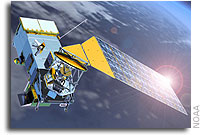Polar-Orbiting Environmental Satellites: With Costs Increasing and Data Continuity at Risk, Improvements Needed in Tri-agency Decision Making

What GAO Found
While selected components of the NPOESS program have made progress over the past year, the program is once again over budget and behind schedule. In terms of progress, three of the five instruments slated for a demonstration satellite (called the NPOESS Preparatory Project–NPP) have been delivered and integrated on the spacecraft; the ground-based satellite data processing system has been installed and tested at both of the locations that are to receive NPP data; and the satellites’ command, control, and communications system has passed acceptance testing. However, the program’s approved cost and schedule baseline are not achievable, and problems with two critical sensors continue to drive the program’s cost and schedule. Costs could grow by $1 billion over the current $13.95 billion estimate, and the schedules for NPP and the first two NPOESS satellites are expected to be delayed by 7, 14, and 5 months, respectively. These delays increase the risk of a gap in satellite continuity. An independent review team established to assess key program risks recently reported that the constellation of satellites is extremely fragile, and that there could be a 3 to 5 year gap in satellite coverage if NPP, NPOESS, or other DOD satellites fail on launch.
The NPOESS Executive Committee responsible for overseeing the program has made improvements over the last several years, but still has not effectively fulfilled its responsibilities. Responding to past concerns expressed by GAO and the Department of Commerce’s Inspector General, the Committee now meets on a regular basis, and has sought and reacted to advice from external advisors to mitigate specific risks. However, the Committee lacks the membership and leadership needed to effectively and efficiently oversee and direct the program. Specifically, the DOD Committee member with acquisition authority does not attend Executive Committee meetings–and sometimes contradicts the Committee’s decisions, the Committee does not track its action items to closure, and many of the Committee’s decisions do not achieve desired outcomes. Program officials and external independent reviewers explained that it is extremely difficult for the Committee to navigate three agencies’ competing requirements and priorities. Until these shortfalls are addressed, the Committee will remain ineffective.
The NPOESS program has conducted two successive studies of alternatives to using the existing system integrator for the last two NPOESS satellites, but neither identified a viable alternative to the current contractor. Both studies assessed a variety of alternatives, including re-competing the entire prime contract, obtaining an independent system integrator while having the existing prime contractor continue to develop space and ground components, and having the government take over responsibility for the system’s integration. The first study identified strengths and weaknesses and the second study identified high-level costs and benefits. Neither study identified an alternative that is viable. Program officials plan to conduct a final study prior to the June 2010 decision on whether to proceed with the existing prime contractor.








